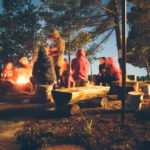N. D. Wilson has written two acclaimed works of non-fiction, Notes from the Tilt-a-Whirl [review] and Death by Living [review], both of which I thoroughly enjoyed and benefited from reading. Such books are bread and butter in church circles. They’re books we can learn from, books that make statements of truth, books with lessons.
Wilson’s fiction, though, is his bread and butter. He’s written two series of novels and is working on a third (along with couple stand-alone books) that might be called young adult fiction, but I can assure you they’re not the least bit juvenile. His stories are fantastic and fantastical—weaving in elements of mythology, heroism, history, and a touch of Indiana Jones-esque panache. His villains are grotesque and evil, while his heroes are vulnerable and courageous. And he steadfastly refuses to fall back on the tropes of romance to fuel his stories like so many young adult novels do.
The feeling you have after reading one of these series is akin to the feeling you find in reading Lewis, Tolkien, or Chesterton. I’m not arguing Wilson’s novels are classics, but they do echo such classics in nobility and tone and truth. And yes, fiction can be true.
I devoured Wilson’s first two series (100 Cupboards and Ashtown Burials) in days, but I think his most recent book, Outlaws of Time: The Legend of Sam Miracle, is his best yet. It’s thrilling and imaginative, and I eagerly await the next installment in the series.
I asked Wilson about his influences as a storyteller, the power of stories in our lives, where an aspiring fiction writer can begin, and more.
Why is it so important for Christians to read good fiction? How do stories shape our behavior and worldview?

For a long time, I never had to think about this at all, because I was unfamiliar with those portions of the church in which fiction and story are highly suspect. I was raised in a family that was constantly telling (and reading and listening to) stories. It all started with The Story: the great epic of creation, the war between the seed of the serpent and the seed of the woman, the curse, and mankind’s long exile. And then came the quadruple-hinge of history—Christmas, the Cross, Easter, Pentecost. My sisters and I knew the story in which we belonged, but intellectually knowing the story and being equipped to live in that story as faithful characters (making faithful choices) are two very different things.
Intellectually knowing the story and being equipped to live in that story as faithful characters (making faithful choices) are two very different things.
And for faithful narratival living, we all need faithful examples and faithful friends (real and fictional). The story in God’s mouth is huge and never-ending—much too large for ours. We need much smaller bites. And we need lenses to help us shrink and capture as much of the whole as possible. We are narrative creatures swimming in a narrative ocean, and we need narrative food, narrative catechisms, narrative marination. Stories are soul food. Stories grow our imaginations, which is to say, stories grow the hands with which we attempt to grasp and process God’s reality. There’s much more to say here; I feel like I’m just skipping wobbly phrases off the surface of a huge, glassy lake. But rather than going on and on, I’ll just leave you with one final quick image.
Many worldly-wise kids/parents/pastors aren’t worried about stories at all. “Yay stories,” just about sums it up. But they enjoy stories purely as pleasurable consumables. Stories are fun—“I like stories.” The end. They don’t dig any deeper than that.
And then there are the uptight churchmarms who stress out about the dangers of VeggieTales just as much as they fret about vampire fiction.
Well, count me in with the churchmarms. We’re in complete agreement about the potency of narrative (and how narratives shape loyalties and desires). We agree that story packs a punch. I just happen to think it can pack a punch for good as well as ill, and I want to use (and celebrate) that potency as God-given. The worldly wise folk sling it around like lemonade when it’s really moonshine.
What books, especially fiction, most affected you growing up? What stories stuck with you, and what about them stands out?
Let’s start with the Old Testament (just to ruffle some feathers). The Bible stories work with far more complex characters and situations than any Christian novelist dares to. What the heck, Tamar? Samson, you did what? Abraham, why are we still telling kings that Sarah is your sister? My imagination was absolutely nourished in Narnia and Middle Earth, and revisiting those books is still like scooping up a deluxe double portion of ice cream. But the stories in Scripture (and in the natural revelation of history) served up all the heavy protein, and my characters are far more Old Testament than they are Narnian. But . . . when I was young, Puddleglum and Faramir were the characters that helped me realize how stupid my Picture Bible was, and they made me want to get to know the ancient saints “for reals.” Fantasy fiction helped me look past the evangelical neutering of the Bible that is all too common, and see things without all the modernist PG filters that have been imposed on it. I realized Gandalf was directly downstream from (and inspired by) Moses—that old man leaning on his staff in Pharaoh’s court. I learned that the entire superhero genre was spawned from the Book of Judges (and Messianic yearnings). Lewis and Tolkien (and Chesterton and Wodehouse) helped calibrate my eyes and my mind to see things that would’ve remained unseen otherwise.
Eye-poke sidenote: it’s also Scripture and this created world that keep me writing magical realism/fantasy. Why? Because Moses. And the plagues. And Passover. And the resurrection. Because dragons and satyrs are in the Bible, if we have the courage to read it like children, with imaginations that remain unashamed of what we might find.
Your books depict numerous virtues and redemptive themes woven into the stories and characters, but they aren’t “Christian novels” in the stereotypical sense. How do you, as a Christian author, depict values without writing an explicitly Christian novel?
My books are not “Christian novels” in the genre sense. In fact, I doubt I could get my next one published at Thomas Nelson (maybe I’m wrong). But my books are Christian novels, heart and soul, blood and bone. Every thread and theme of truth in my stories grows directly out of my faith. From Leepike Ridge (my first novel) through the 100 Cupboards series and the Ashtown Burials series and my new Outlaws of Time trilogy, I’ve done nothing but directly and indirectly rip off the Author who made us all. I try to honor what he honors and damn what he damns. I imitate his arcs, his plots, and his characters. And just like he does, I soak the whole thing in magic that is typically taken for granted. And then I throw in some sleight of hand just to keep it from getting too Sunday school-ish. I could really get going talking about Ashtown and my direct thefts from Isaiah that no one ever seems to notice . . .
I’ve done nothing but directly and indirectly rip off the Author who made us all. I try to honor what he honors and damn what he damns. I imitate his arcs, his plots, and his characters. And just like he does, I soak the whole thing in magic that is typically taken for granted.
The villains in your novels are despicable—truly hateable characters. The conflict is intense and even violent. Yet you write with no gratuitous gore, profanity, or any such offensive content. How do you depict evil so clearly without making the story grotesque or, like many authors, making the evil almost titillating?
Because true darkness is petty to the core (I’m stealing from Lewis here). The heart is where the deepest rot is, and that can be revealed without bathing the reader in exhaustive and particular filth. It’s essential to work with darkness in our storytelling (God does), but it’s also essential to remember our own fallen humanity. Any story that gives readers vicarious thrills through explicit depictions of darkness is a dangerous story. But any story that ignores, erases, or patronizes evil is dangerous as well, and far more sneaky. Once again, we have plenty of examples (inspired and otherwise) to imitate.
Writing fiction feels like a nearly impossible task to me. There are seemingly infinite characters and stories and worlds. Where would you suggest I, or any aspiring story writer, begin?
Reading! Reading widely and reading critically.
Obviously, there’s a lot more to say here. But instead of saying it, how about I just reopen an old promotional offer for TGC readers for the rest of September? I’ve been putting together a short video series for aspiring writers (The School of Fantastical Wordcraft). Seven lessons have already been filmed and posted (to be followed by two more and some FAQ videos). Anyone interested need only pick up a copy of my new book, Outlaws of Time: The Legend of Sam Miracle, through any retailer and then email a copy of the receipt to [email protected]. The good folks over there will give you a password to watch all the writing videos for free.
Is there enough evidence for us to believe the Gospels?
 In an age of faith deconstruction and skepticism about the Bible’s authority, it’s common to hear claims that the Gospels are unreliable propaganda. And if the Gospels are shown to be historically unreliable, the whole foundation of Christianity begins to crumble.
In an age of faith deconstruction and skepticism about the Bible’s authority, it’s common to hear claims that the Gospels are unreliable propaganda. And if the Gospels are shown to be historically unreliable, the whole foundation of Christianity begins to crumble.


































